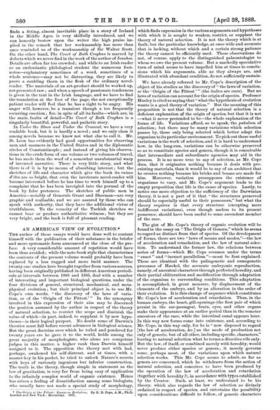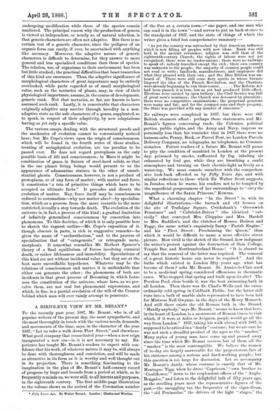AN AMERICAN VIEW OF EVOLUTION.*
THE author of these essays would have done well to content himself with the publication of their substance in the briefer and more systematic form announced at the close of the pre- face. A very considerable amount of repetition would have been thus avoided ; while the note-book style that characterises the contents of the present volume would probably have been replaced by a less rugged and more lucid manner. The twenty-one studies here brought together from various sources, having been originally published in different American periodi- cals at intervals between 1868 and 1885, deal with a number of interesting and important biological questions, under the four divisions of general, structural, mechanical, and meta- physical evolution ; but their principal object is, to use Mr. Cope's own words, "the discovery of the laws of varia- tion, or of the Origin of the Fittest.' " In the synonymy involved in this expression of their aim may be discerned the position assumed by the author in respect of the theory of natural selection, to restrict the scope and diminish the value of which—in part, indeed, to supplant it by new hypo- theses—is their logical purport. No doubt some of Darwin's theories must fall before recent advances in biological science. But the great doctrine over which he toiled and pondered for twenty years ere he gave it to the world, holds among the great majority of morphologists, who alone are competent judges in this matter, a higher rank than Darwin himself assigned to it. The opposition the theory met with had, perhaps, awakened his self-distrust, and at times, with a master-key in his pocket, he tried to unlock Nature's secrets with keys of variously ingenious but inferior construction. The truth is, the theory, though simple in statement as the law of gravitation, is very far from being easy of application to the infinitely complex world of organic existence. Hence has arisen a feeling of dissatisfaction among some biologists, who usually have not made a special study of morphology, • The Origin of the Fittest: Essays on Evolution. By 13. D. Cope, A.M., Ph.D. London and New Yolk: Macmillan. 1897.
which finds expression in the various arguments and hypotheses with which it is sought to weaken, restrict, or supplant the theory of natural selection. It is not the theory which is at fault, but the particular knowledge, at once wide and accurate that is lacking, without which and a certain strong patience the theory cannot be efficiently used. These observations do not, of course, apply to the distinguished palsontologist to whom we owe the present volume. But a markedly speculative turn of mind seems to have impelled him at times to conclu- sions which his arguments, able as they always are, and illustrated with abundant erudition, do not sufficiently sustain.
We have already referred to Mr. Cope's description of the object of his studies as the discovery of "the laws of variation, or the Origin of the Fittest ' " (the italics are ours). But no laws of variation can account for the origin of species. Professor Huxley is cited as saying that "what the hypothesis of evolution wants is a good theory of variation." But the meaning of this proposition is not that the theory of natural selection is a deficient explanation of the origin of species, but that it is not —what it never pretended to be--the whole explanation of the forms of life. Variations afford, so to speak, the pabulum of selection ; but there may be many variations which selection passes by, those only being selected which better adapt the organism to its particular environment. To pick out these useful variations is the work of selection, and it is hard to understand how, in the long-ran, variations can be otherwise preserved so as to constitute species and genera, though it is conceivable that intermediate and subordinate agencies may aid in the process. It is no more true to say of selection, as Mr. Cope does, that it originates nothing because it deals with pre- existing materials, than it would be to say of an architect that he creates nothing because his bricks and beams are made for him. Moreover, variation presupposes the existence of organisms to vary, and Mr. Cope's argument leads to the empty proposition that life is the cause of species. Lastly, to notice one more objection to the sufficiency of the Darwinian theory, it is not a part of it that "the structures preserved should be especially useful to their possessors," but what the theory requires is that every structure (excepting mere indifferent variations), even though useless to its present possessor, should have been useful to some ascendent member of the raze.
The gist of Mr. Cope's theory of organic evolution will be found in the essay on "The Origin of Genera," which he seems to regard as distinct from that of species. Of the development of forms, there are two "laws of means and modes,"—the law of acceleration and retardation, and the law of natural selec- tion. To understand the former law, the relations between series of forms—which Mr. Cope resumes under the terms " exact " and "inexact parallelism "—must be first explained. These are identical with the palin' genetic and etenogenetic processes of Henkel, the accurate embryonic reproduction, namely, of ancestral characters through perfected heredity, and their partial obliteration and modification through adaptation of the organism to surrounding conditions. This adaptation is accomplished, in great measure, by displacement of the elements of the embryo, and by an alteration in the order of their evolution. It is this change of sequence which constitutes Mr. Cope's law of acceleration and retardation. Thus, in the human embryo, the heart, gill-openings (the first pair of which persist in the ear-passages), brain, eyes, and other organs make their appearance at an earlier period than in the remoter ancestors of the race, while the intestinal canal appears later. In this way new forms come into existence, and, according to Mr. Cope, in this way only, for he is "now disposed to regard [the law of acceleration, &c.] as the mode of production not only of generic, but of all other, including specific, characters," leaving to natural selection what he terms a directive ride only. But the law, of itself, or combined merely with heredity, would never produce either species or genera; it merely governs some, perhaps most, of the variations upon which natural selection works. This Mr. Cope seems to admit, as far as genera are concerned, which he withdraws from the action of natural selection, and conceives to have been produced by the operation of the law of acceleration and retardation (together with heredity?), in accordance with types established by the Creator. Such, at least, we understand to be his theory, which also regards the law of selection as divinely ordained in respect of species, and entertains the possibility upon considerations difficult to follow, of generic characters undergoing modification while those of the species remain unaltered. The principal reason why the production of genera is viewed as independent, or nearly 80, of natural selection, is that generic characters are often not adaptive. But there is no certain test of a generic character, since the pedigree of an organic form can rarely, if ever, he ascertained with anything like accuracy. Moreover, the adaptive nature of generic characters is difficult to determine, for they answer to more general and less specialised conditions than those of species. The relation, too, of organisms to their environment has been but little studied ; the practical difficulties that beset researches of this kind are enormous. Thus, the adaptive significance of morphological characters of great importance may be entirely overlooked, while parts regarded as of small morphological value, such as the nectaries of plants, may, in view of their physiological importance, assume, in the course of development, generic rank. Not that nectaries, so far, are known to have assumed such rank. Lastly, it is conceivable that characters originally adaptive may survive through heredity in a non- adaptive state as the sole characters of a genus, supplanted, so to speak, in respect of their adaptivity, by new adaptations having as yet only a specific value.
The various essays dealing with the structural proofs and the mechanics of evolution cannot be conveniently noticed here ; but Mr. Cope's views upon the origin of consciousness, which will be found in the fourth series of these studies, treating of metaphysical evolution, are too peculiar to be passed over. He does not regard protoplasm as the only possible basis of life and consciousness ; in Mars it might be combination of gases, in Saturn of steel-hard solids, so that in the one planet living beings would present to us the appearance of adamantine statues, in the other of unsub- stantial ghosts. Consciousness, however, is not a product of protoplasm, or of any form of matter ; with matter and force, it constitutes "a trio of primitive things which have to be accepted as ultimate facts." It precedes and directs the evolution of matter. Nay, force itself may be consciousness reduced to automatism—why not matter also ?—by specialisa- tion, which as a process from the more versatile to the more restricted, is really a step towards death. The evolution of the universe is, in fact, a process of this kind ; a gradual limitation of infinitely generalised consciousness by concretion into phenomena. To this doctrine, of which it is only possible here to sketch the vaguest outline—Mr. Cope's exposition of it, though obscure in parts, is rich in suggestive remarks—he gives the name of " archmsthetism," and to the process of specialisation that of " catagenesis," or retrograde meta- morphosis. It somewhat resembles Mr. Herbert Spencer's theory of a final equilibrium of forces involving cosmical death, or rather lifelessness and immobility. Speculations of this kind are not without incidental value ; but they are at the best mere unverifiable hypotheses. Whatever may be the relations of consciousness and matter, it is unthinkable that either can generate the other ; the phenomena of both are incidents in that great process of Becoming in which Lotze sees the constitution of the universe, whose laws, as we per- ceive them, are not real but phenomenal expressions, and which, in fine, is a partial revelation of the will of the Creator behind which man will ever vainly attempt to penetrate.



































 Previous page
Previous page